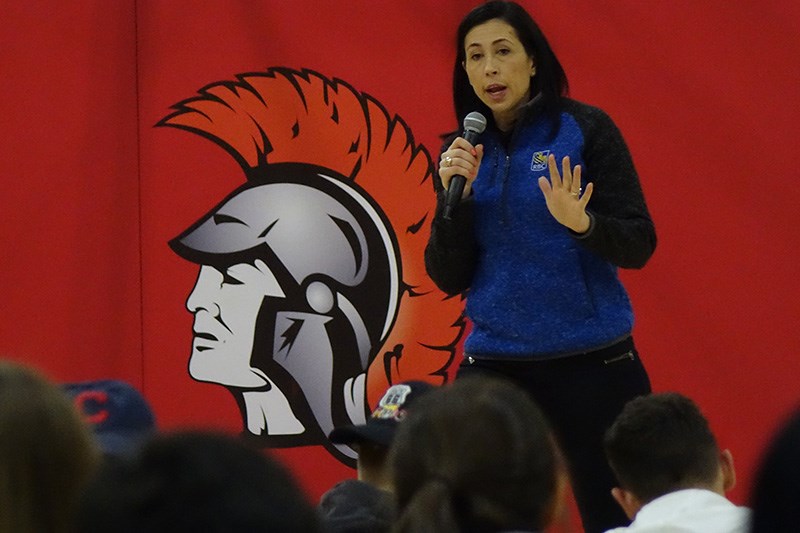R.D. Parker Collegiate student-athletes got some tips on achieving their goals April 26 from Canadian and Olympic curling champion Jill Officer, an RBC Olympian who was in Thompson as part of the RBC Training Ground athlete identification camp that took place the following day.
Officer, who was born and raised in Winnipeg and achieved sporting success as a member of Jennifer Jones’s curling team, said she sort of fell into the sport that earned her Olympic gold because her mother was very involved in curling.
“When I was 10 there was a spot that opened up on a team in the league that my mom ran,” she said. “She put me on the team because I wanted to do that. I started to play and I loved it.”
Officer said she had never even won a curling zone championship before Jones asked her to join her team.
“The first year we played together we went to the provincials and we made it all the way to the final which was just mind-blowing to me,” she recalls.
But the team’s success was also forged by failure.
“We lost,” she says of that first provincials. ”I just remember being absolutely devastated for at least a week. I don’t think I realized how much I wanted it until I lost it. I think it’s really important to go through that process. It’s almost like the grieving process. That’s when you get back up on your feet. That’s when you find your brave or whatever you want to call it, your brave, your courage or your confidence. The next year we ended up winning the provincials and going to nationals.”
The process repeated itself on the national stage, in Olympic curling trials.
“We tried two times to get to the Olympics before we actually made it there,” Officer said. “Every time we got knocked down we kept going through that process and getting back up.”
And as hard as it was to get to the top, Officer said it was as hard or harder to stay there.
“Eventually the training became harder because our curling season also got longer,” she said.
As important as training and practice and nutrition are, Officer said it is also important to take time away from sport for physical recovery and mental and emotional well-being.
“Make sure you’re getting recovery time,” she said. “Make sure you’re being a teenager. Make sure you’re spending time with your friends.”
If you don’t, she said, you could end up feeling like she did when she stepped away from curling a year or so ago.
"I became very mentally and emotionally exhausted."
Officer worked in journalism and communications for a few years during her curling career with Jones, which spanned 23 years but also included breaks for college and work. As an RBC Olympian for the past 11 years, she has had the opportunity to talk at schools and do keynote speeches. She recently began doing curling analysis on CBC broadcasts as well.
But one of the highlights of her life was winning a gold medal in Sochi, Russia in 2014, she said, passing around her medal so the audience could hold it and examine it.
“I’m one of those lucky athletes that went through the Olympics and had the most amazing experience,” she said. “We went through undefeated. The worst part of our trip was when we had to come home.”
She also said that she learned in her career not to pay attention to what people are saying about you in the media or on social media.
“We just learned that we had to stop reading it.”
Officer also found that some of her biggest challenges were keeping motivation and not being afraid to voice her opinion.
“Looking back there were times that I should have spoken up but I didn’t,” she said.




